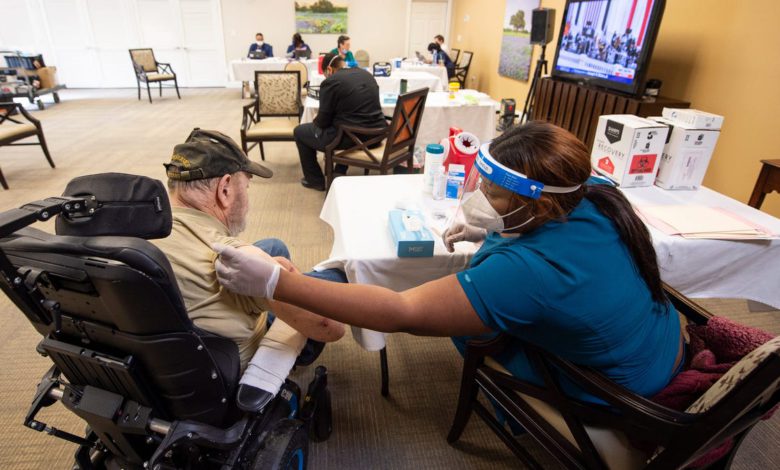
WASHINGTON — Two weeks after Joe Biden won the 2020 election, Brittany Williams, a third-generation home care worker from Seattle, made a direct plea to the president-elect: deliver on his campaign promise to prioritize workers like her.
"Caregivers – we're the maintainers of life," an impassioned Williams, 34, said during a zoom call with frontline health care workers hosted by the soon-to-be president.
Long overlooked and often ignored, caregiving was "literally birthed out of slavery and bondage," Williams, an African American mother of two children, told Biden. After doctors treat the elderly and disabled, caregivers "maintain that care," she said. They feed their patients, bathe them, dress them. They also go to the grocery store and pharmacy on their behalf, putting their own health at risk during a global pandemic.
"We continue to work our job because it means so much to us," she said.
Biden committed on the spot. Five months later, the president has now proposed $400 billion to overhaul caregiving in the U.S., making it one of the most significant planks of of a $2.25 trillion infrastructure and jobs plan that would be funded by a corporate tax hike. Long-term care experts say it would mark a historic investment for a workforce that is 87% women – 61% women of color – earns an average of $12.12 an hour and includes many immigrants.
"For too long," Biden said in a speech announcing his American Jobs Plan, caregivers "have been unseen, underpaid and undervalued."
Yet the proposal is getting fierce pushback from Republicans. Caregiving is the most glaring example of how the White House expanded the traditional definition of infrastructure in its jobs proposal to include "human infrastructure" and "social infrastructure." Republicans argue Biden should have limited his legislative package to the repair of roads, bridges, railways and other physical infrastructure.
"This plan is not about rebuilding America’s backbone," Senate Republican Leader Mitch McConnell said.
In a tweet singling out "$400 billion towards elder care," Sen. Marsha Blackburn, R-Tennessee, said flatly: "President Biden's proposal is about anything but infrastructure,"


Biden's aim is twofold: Reduce a backlog of between 820,000 and 1 million low-income elderly and disabled Americans unable to receive the in-home care services they seek. And do so by tackling a workforce shortage with increased pay, benefits and the right to unionize to grow the nation's 2.4 million professional home care workers.
'We can't delay': Biden proposes $2 trillion infrastructure, jobs plan funded by corporate tax hike

Democrats and advocates make a connection that critics don't, calling caregiving positions "job-enabling jobs." The U.S. economy can't thrive, they say, while many Americans, usually women, are forced to leave the workforce because they can't find caregivers for their loved ones. One survey found 1.4 million fewer mothers are working today than at the beginning of the pandemic in January 2020 to take on caregiving for their children, aging relatives or other loved ones.
Black, Latina and immigrant mothers are losing jobs as COVID-19 child care crisis grows
"If you think about what roads, bridges, care and paid leave have in common – they all enable us to get to work," said Lisa Guide, co-founder of the Women Effect Action Fund, which advocates for women equity. "The next period of American properspity is going to be built on an economic recovery that enables all Americans, including women, to work hard and contribute to a growing economy."
The $400 billion for caregiving would go to states through an expansion of Medicaid, making more funds available for home and community-based services in states that boost pay, offer paid leave and health care for caregiving workers, and meet other conditions. Biden's plan would also extend the Money Follows the Person program, a Medicaid program that seeks to move seniors and disabled individuals out of institutions and back into their homes
The proposed overhaul would effectively treat in-home care equal to institutional care under Medicaid, delivering on a long-held demand of advocates.

Dolores McGinnis, left, carries flowers, and her co-worker Stacy Munoz-Laporte brings a birthday cake for Josephine Melecio as she celebrates her 110th birthday, Friday, March 26, 2021, in New York. McGinnis and Munoz-Laporte are nurse care managers with RiverSpring Health, a long-term care program that assists the elderly in living independently at home.

The White House doesn't have an official estimate of how many jobs the proposal would create for caregivers. But during the campaign, Biden said his plan to improve the "care economy" would create an additional 1.5 million new caregiving jobs.
Biden's plan also calls for increasing the average pay of caregivers to $15 an hour, which would allow them to avoid having to take on a second or even third job – not uncommon because of the low pay. Proponents say it would allow caregiving to become a more viable long-term career. The median annual salary for a caregiver is $17,200.

"You might say to yourself, 'Why is the commerce secretary talking about investments in the care economy?' " Biden's Commerce Secretary Gina Raimondo said in a White House press briefing last week. "Because it matters. It is core to our competitiveness. In order for you to go to work, you need to know that your loved one is being taken care of."
'I'm not OK but I'm doing the best I can': Caregivers face impossible challenges during COVID
For years, the Service Employees International Union, which endorsed Biden in the 2020 Democratic primary, has led the lobbying effort nationally for legislation action on caregiving.
With 10,000 people turning 65 years old daily, caregiving is the fastest growing industry in the nation, according to SEIU, which represents 800,000 caregivers across 14 states. An estimated 4.7 million additional home care employees will be needed by 2028, according to the Paraprofessional Healthcare Institute. A study from Harvard University found 40 million Americans provide unpaid caregiving for an older adult.
President Biden pitches $2 trillion infrastructure and jobs plan
The White House is comparing President Joe Biden's infrastructure proposal to the construction of interstate highways and the Space Race.
staff video, USA TODAY
"This investment is a sustainable jobs program for a majority women of color workforce," Mary Kay Henry, president of SEIU, said of Biden's proposal. "It's the same population that lost a lion's share of the jobs during COVID-19. And I think it will create the most inclusive racially diverse middle class we've ever seen."
Henry said the federal government's neglect of caregivers goes back to Franklin D. Roosevelt's New Deal, which excluded federal protections for caregivers and other domestic roles, often held by Black Americans, as a compromise with Southern Democrats.
"This is game changing," she said.


Some home caregivers work for private home care agencies while others are employed through state-sponsored programs with funding from Medicaid.
Care experts say the backlog to receive in-home care is in reality greater than 1 million, perhaps by hundreds of thousands, because many Americans don't realize it is available and applications for services go unprocessed.
In California alone, more than 40,000 individuals each month are unable to receive caregiving services even though they're enrolled in the state's program for in-home supportive services, a recent audit found.
"Finding providers that have skills and are able to take care of those people is a pretty huge challenge," said Greg Thompson, executive director of the Personal Assistance Services Council of Los Angeles County, a government authority that oversees a registry for caregiving services for low-income.

Making it difficult to recruit caregivers, the average pay in Los Angeles County, $15 an hour – while higher than the nationwide average – is below the city's living wage. Thompson also said the profession doesn't offer professional training, dissuading many who might be interested in the job. It means a workforce unable to meet the demand, creating serious repercussions for those who can't get care.
"In the most extreme cases, they're calling 911 and going to emergency rooms and being hospitalized and potentially ending up in nursing homes," he said.
Ramsey Alwin, president and CEO of the National Council, said increasingly more people – 90% according to some polls – prefer to age in their own homes, not a nursing home. That was already the case before nursing homes became ground zero for the spread of the COVID-19 virus. She called Biden's plan "a momentous, historical, radical shift in thinking about infrastructure"
"After generations of policy neglect in terms of addressing the needs of the care economy, we finally get a measure of recognition with this proposal," Alwin said, adding that investing in home and community-based services "frankly should have happened decades ago."
"We knew when the Baby Boomers were born that there would be this need ultimately. And unfortunately, we just haven't had the political will to to build the systems that we knew would be needed."

Nicole Jorwic, senior director of public policy at The Arc, which advocates for people with intellectual and developmental disabilities, said Biden's plan would "literally be life-changing" for people with disabilities and aging adults while creating jobs.
"This is a system that has been under great threat because of the way that it is funded. It is now our opportunity to turn those threats into real change."
Caregiving advocates feel emboldened by the moment, convinced the pandemic exposed the need for greater in-home care like never before. They are also looking past Biden's American Jobs Plan to his next legislative proposal, the American Families Plan, which the White House has said will be released later this month. It is expected to address child care and early childhood education. Advocates are pushing for 12 weeks of paid leave to be included in the second plan.
"We are at the tipping point of a major opportunity to remake our economy so that it leads with a caring agenda," said Lorella Praeli, vice president of Community Change. She helping lead the #CareCantWait coalition, which intends on spending $20 million to push caregiving in Congress.
But Republicans and conservative groups have slammed caregiving as a partisan add-on and balked at the proposed tax increases as they mount a united front against Biden's plan. David Ditch, a researcher for the Heritage Fund, wrote that "no reasonable definition of infrastructure includes expanding Medicaid benefits for long-term care or starting new social benefit programs."
Sen. Roy Blunt, R-Missouri, said it would be an "easy win" for the White House with Republican support if Biden axed the proposal to 30% of the total package, focusing only on roads, bridges, broadband and other traditional infrastructure.
"This whole concept of, 'Well, we also need an infrastructure of care,'" Blunt said in an interview on Fox News. "Obviously, Democrats have figured out that infrastructure is something we need and something that's popular, and so they're trying to take 70% of this bill and call it infrastructure in a new way than we've ever talked about infrastructure before."

The White House has pointed to polling that shows broad early support for Biden's jobs plan including caregiving. A Morning Consult/Politico poll last week found 76% of voters support $400 billion to improve caregiving for the aging and disabled while only 13% oppose it.
After a ruling last week by the Senate parliamentarian, Biden and Democrats could pass the American Jobs Plan with a simple majority in the Senate, meaning no Republican votes would be needed as long as Democrats are all on board.

More: How does Biden plan to get infrastructure plan through Congress?
In the south side of Chicago, Adarra Benjamin, 27, has worked as a caregiver since high school, first taking care of her great-grandmother before turning it into her career. Benjamin comes from a lineage of other caregivers in her family. She is currently caring for a 22-year-old physically disabled woman who is confined to a wheelchair.
Benjamin, an SEIU member employed by Addus HomeCare, arrives at the woman's home at 7:30 a.m. She bathes and dresses her, brushes her teeth, supplies her medication and cooks breakfast. Benjamin then gets her ready for her schooling. After studies, Benjamin takes her outside for a walk, returns for a home-cooked dinner and bathes her again before bedtime. She leaves around 7:30 p.m.
"It's a lot to take of yourself and then you go out to take care of someone else," Benjamin said. She is convinced that higher pay and benefits will make the job more attractive for others. "It will make it easier for this to be an option or a career as opposed to this being a job."
She said the work is "beyond underappreciated."
"I feel like the work that we do has been unnoticed forever," Benjamin said. "This is the first time we've had a president whose agenda is to better the homecare health system. We've never been lifted up in a light of being essential."
Reach Joey Garrison on Twitter @joeygarrison.







